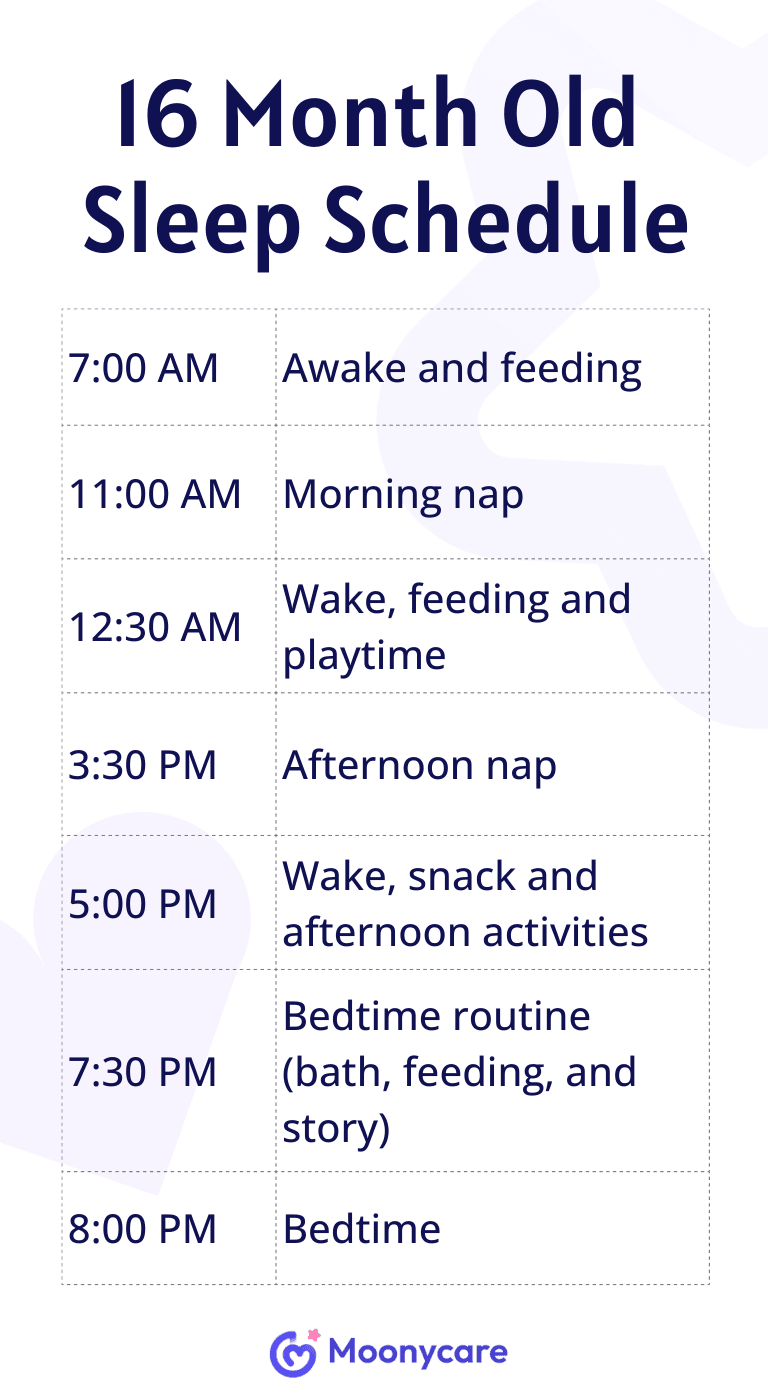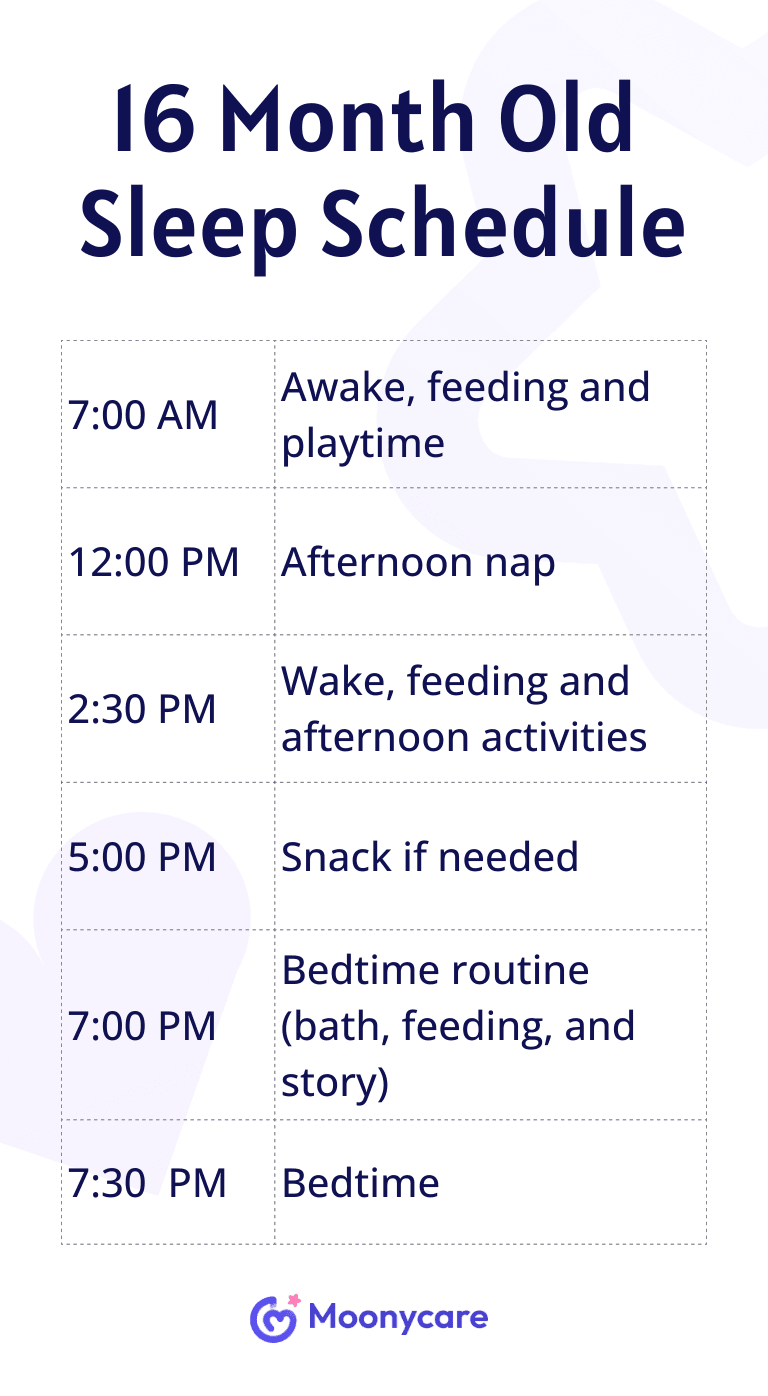

Creating a consistent sleep schedule for the baby can greatly benefit both the child and the parents by fostering a predictable routine that supports the child's growth and well-being. At this age, toddlers typically experience significant developmental milestones, which can impact their sleep patterns. Here's an in-depth look at crafting an ideal sleep schedule for a 16-month-old, considering their unique needs and the potential challenges that may arise.
As your baby reaches 16 months, their sleep patterns continue to evolve, and establishing a consistent sleep schedule becomes crucial. Moonycare, a trusted parenting app, offers powerful support to help you navigate this stage. Whether your toddler is still taking two naps or has transitioned to one, it will always calculate an accurate schedule for your baby with appropriate management of nap and wake windows, promoting baby's overall development and well-being.
IN THIS ARTICLE:
What are Wake Windows for a 16 Month Old?
A Sample Sleep Schedule for 16 Month Old Babies
How Much Should a 16 Month Old Sleep?
How Long Should a 16 Month Old Nap?
How Many Naps are Suitable for a 16 Month Old?
Is 16 Months too Early for One Nap?
What Time Should a 16-Month-Old Go to Bed?
Can a 16-Month-Old Baby Sleep Through the Night?
Can you Sleep Train a 16-Month-Old?
Is there Sleep Regression for 16 Month Old Babies?
What are Wake Windows for a 16-Month-Old?
Wake windows are the intervals of time that your toddler is awake between sleep sessions. For a 16-month-old, these wake windows generally range from 4 to 6 hours. These periods are critical because they strike a balance between giving your toddler enough time to explore and preventing overtiredness, which can negatively impact sleep quality.
Two-Nap Wake Windows
If your 16-month-old is still on a two-nap schedule, the wake windows might look like this:
-
Morning Wake Window: 4 hours after waking up
-
Afternoon Wake Window: 4 hours after ending the first nap
-
Evening Wake Window: 4-5 hours after ending the second nap
One-Nap Wake Windows
For toddlers transitioning to one nap, the wake windows extend as follows:
-
Morning Wake Window: 5-6 hours after waking up
-
Afternoon/Evening Wake Window: 4-5 hours after the end of the nap
The transition from two naps to one can be a gradual process, so it's important to adjust wake windows accordingly to ensure your toddler is not too tired or overstimulated.
Sample 16-Month-Old Sleep Schedule
Creating a structured sleep schedule can help manage your toddler's sleep more effectively. Here are two sample schedules, one for a toddler taking two naps and one for a toddler who has transitioned to a single nap:
Two-Nap Schedule:

One-Nap Schedule:
How Much Should a 16-Month-Old Sleep?
Typically, a 16-month-old needs around 12 to 14 hours of sleep within a 24-hour period, including 10 to 12 hours of nighttime sleep. While these numbers can vary slightly depending on your child's unique sleep needs, ensuring they get enough rest is vital for their growth and development.
How Long Should a 16-Month-Old Nap?
The length of naps for a 16-month-old can vary based on whether they are taking one or two naps. For a two-nap schedule, each nap might last 60 to 90 minutes. If your toddler has transitioned to a single nap, it may extend to 2 to 3 hours. The key is ensuring that the total duration of nap is sufficiently restorative and align with your toddler's overall sleep needs.
How Many Naps are Expected for a 16-Month-Old?
At 16 months, many toddlers are transitioning from two naps to one. This change is a natural part of their sleep evolution. Some toddlers may still benefit from two shorter naps, while others may be ready for one longer nap in the middle of the day. Pay attention to your child's sleep cues and adjust the schedule accordingly. A gradual transition, if necessary, can help minimize disruptions.
Is 16 Months too Early for One Nap?
No, 16 months is a common age for toddlers to transition to one nap. It is normally caused by developmental milestones, teething, an increasing desire for exploring or playing or other reasons. However, this change varies by child. Signs that your toddler may be ready for one nap include difficulty falling asleep for the second nap, shortened nap duration, or resisting bedtime. If your toddler is showing these signs, it might be beneficial to try a one-nap schedule and observe how they adapt.
What Time Should a 16-Month-Old Go to Bed?
The ideal bedtime for a 16-month-old usually falls between 7:00 and 8:00 PM. This timing helps ensure they get a full night's rest for brain development. However, if your toddler consistently wakes up too early or has trouble falling asleep, consider adjusting bedtime by 15 to 30 minutes earlier or later. This small shift can make a big difference in sleep quality.
Can a 16-Month-Old Baby Sleep Through the Night?
Yes, many babies at this age are capable of sleeping through the night for 10 to 12 hours. However, individual sleep needs vary, and some toddlers may still wake occasionally. It can be affected by teething, separation anxiety, over tiredness, hunger and other discomfort factors. If night wakings are frequent, assess their daily routine, sleep environment, and consider sleep training methods if necessary.
Sleep Training a 16-Month-Old
At 16 months, sleep training may become necessary if your toddler is having trouble falling asleep independently, staying asleep through the night, or resisting bedtime. Methods like the Ferber method or the Chair method can be effective. However, these methods may not work immediately; it often takes persistence and consistency to see results. Establishing a predictable bedtime routine and sticking to it can help your toddler understand that it's time to sleep.
Sleep Regression of a 16-Month-Old
Around 16 months, some toddlers experience a sleep regression, which can result in increased night wakings, nap resistance, or difficulty falling asleep. This regression is often tied to significant developmental milestones, such as language acquisition, motor skills, or teething. To manage this regression, maintaining a consistent sleep routine, offering comfort as needed, and being patient to your toddler will work through this phase.
16-Month-Old Sleep Tips
Here are some strategies to help ensure your 16-month-old gets the rest they need:
-
Maintain Consistency: A predictable routine is vital. The included activities tend to be calm like reading or a warm bath before bed, which aims for giving the baby a signal that it's time to wind down.
-
Optimize the Sleep Environment: Make sure your child's room is conducive to sleep. This includes a dark, quiet space with a comfortable temperature and minimal distractions.
-
Balanced Nutrition: A healthy diet can affect sleep quality. Ensure your toddler is eating well-balanced meals and snacks throughout the day.
-
Physical Activity: Encourage plenty of physical activity during the day, which can help your child fall asleep more easily and sleep more soundly at night.
-
Monitor Wake Windows: Keep an eye on wake windows to avoid overtiredness, which can make it harder for your toddler to settle down at nap time and bedtime.

























